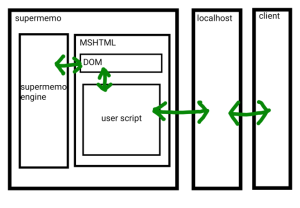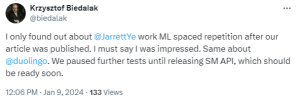Difference between revisions of "36th SuperMemo anniversary event"
Jump to navigation
Jump to search
m |
m |
||
| Line 63: | Line 63: | ||
==== Supermemo API ==== | ==== Supermemo API ==== | ||
[[File:Krzysztof Biedalak twit about supermemo API releasing soon.png|thumb|Krzysztof Biedalak twit about supermemo API releasing soon]] | |||
AA | |||
==== Supermemo for | AA | ||
==== Supermemo for Windows integration with supermemo.com ==== | |||
==== Supermemo algorithm vs FSRS ==== | ==== Supermemo algorithm vs FSRS ==== | ||
Revision as of 16:53, 17 February 2024
Pre-event text-based Q&A
Piotr Wozniak answered some questions before the start of the event.
- When to open source SM?
- open source is a matter of community, not individuals
- Yes, but if all is closed code, then the open community has to start at zero. As I understand it, the question is whether SM could offer interfaces for open source that could be built upon without giving away the secrets
- the best resolution to chicken-and-egg is to start small with alg-sm2, and build momentum by proving the strength of the community; the Alg is not the most important part of such a project; with Jarette, the last excuse is gone 🙂
- Yes, but if all is closed code, then the open community has to start at zero. As I understand it, the question is whether SM could offer interfaces for open source that could be built upon without giving away the secrets
- open source is a matter of community, not individuals
- How do you feel about FSRS?
- feel great!
- Are you aware of FRSRS?
- aware, appreciating, crossing fingers but buried in the priority queue.
- Why do you hate your customers?
- best question! if no better shows up, I will start from this. (Note, he didn't).
- What’s the priority algorithm of SuperMemo? Will Woz write documents for the priority algorithm like he has written for the memory algorithm?
- documenting it in detail would be very expensive, but we can address individuals (dis)likes
- What is the future direction of development for SM? Better algorithms or something else?
- nothing revolutionary on 5000 task tasklist; today progress feels incremental; it always does until a big thing shows up, or little thing turns out to be a big thing
- What is the main focus of woz's investment in the near future? Spring of Students? SM development? Or something else?
- the biggest thing is "freedom for the brains"
- How many SM-programmers do you currently employ?
- 5.
- Note: I think 5 developers is for supermemo World company, which does not mean 5 people work on SM for windows.
- 5.
- Maybe I missed it. I have read it just now. I'm not very interest to continue the comparison between FSRS and SuperMemo, because only Woz could implement SuperMemo.
- implement "SuperMemo" sounds intimidating; anyone can implement a simple algorithm based on 3-component model of memory; only data sets are an issue
- In the last event Woz was quite enthusiastic about finding ways for the community to contribute more directly to SM. APIs, plugins, even open source were discussed. What's the current state of this topic within the SM team, any progress, are they still open to/interested in the idea?
- BEST QUESTION ... social concept network is the answer. Even if this is the best Q, we should move it to the last 10 min. or Part II (this is a broad and important topic that might squeeze out oxygen from the meeting)
- Will SM20 have some sync capabilities with the phone app of SM world? Based on https://supermemopedia.com/index.php?title=Synchronization_with_supermemo.com&diff=33992&oldid=33991
- there is only one weak cog in the machine: Woz and his tasklists, Plans and priorities; perfection can be crippling 🙂 ... PUSH ME!
- When will the public scheduling API become available?
- Can the functionality of YouTube.htm be kept the same in future versions of SM to allow users to continue to write their own incremental video scripts?
- I believe that it is possible to implement a functional API within SM by using the techniques you have already implemented for YouTube.htm (aka reading the <input> and <option> fields). Would you be interested in providing source code for portions of SM related to YouTubeVideo.htm, and how MSHTML is used to render Elements? Based on my findings, you could provide an API without a major refactoring of the source code by adding more <input> fields user scripts can toggle.
- I am impressed! The brain treats it like an instant subconscious boost to priority!
- For what purpose do you use these arrows? ("to the beginning of the collection"; "to the end of the collection") Do you misuse it as a quick switch to favourites? Or what purpose do you have for it? I don't think I have ever used these outer arrows.
- I do not use those buttons either, but they were born in 1995 following a multimedia courseware standard; for multimedia courses they were like maximize/normal/minimize in windows
- Yeah, I agree with that. FSRS is also based on DSR model. The main bottleneck is the optimization. SuperMemo has many matrixes like R-matrix to optimize the parameters of DSR model. They are complicated.
- yes. with your good knowledge of ML, you can forget matrices and theory; just stick to the model; for me the biggest value of alg-sm17 is not efficiency, but insights into the model itself; I can say that with a solid re-afirmation of theory, my whole life changed because see brains in a totally different way than 99.99% of the planet
- What do you mean with "data sets are an issue"? Can you explain the issues?
- I loved my 2-3 years with alg-sm17 because I could play like a baby with my 30 years of data, pondering individual items and their history and how their intertwine with personal life; without that factor, the job would get far more boring and technical. If you have a good theoretical model, all you need is a good dataset (I hear mnemosyne has the largest, but that's not incremental reading, so it would fit better Anki-like work mode)
BEST QUESTION ... social concept network is the answer. Even if this is the best Q, we should move it to the last 10 min. or Part II (this is a broad and important topic that might squeeze out oxygen from the meeting)
Main topics that were discussed:
Supermemo API
AA
AA


